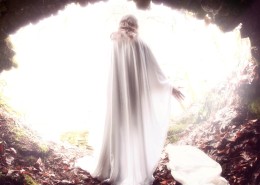In God’s eyes, good and evil don’t mix. God is good, loves good things, and loves those who do good things. God hates evil, hates evil things, and hates those who do evil things (Psalm 5:5). God is loving and forgiving, but he is also just and must punish sin. All of this means that those whom God sees as evil cannot dwell with those whom God sees as good. That is why there is a heaven and there is a hell.
Heaven is a Holy Place
“From heaven the LORD looks down and sees all mankind.”
Psalm 33:13
While the Bible uses the words “heaven” and “heavens” to describe the sky, the sun, the moon, the stars, and the planets, the Bible also uses the word heaven to describe the place where God dwells (e.g., 1 Kings 8:30; Psalm 115:3; Matthew 10:32; Ephesians 6:9). It is often referred to as God’s throne (e.g., Psalm 2:4; Isaiah 63:15) and is a place of complete holiness (Psalm 5:4; Daniel 4:37; Matthew 6:9). While heaven definitely is a “somewhere,” we don’t know how to describe precisely where that “somewhere” is. But what we know from Scripture is that it is a real place, a perfect place.
God is not the only one who dwells in this perfect heaven. The Bible tells us that those believe in the Savior and have died also dwell in heaven in God’s presence (2 Kings 2:1-11; Psalm 11:7; Matthew 17:1-9, 18:10; 2 Corinthians 5:1-10). They have been declared holy through their faith in the work of Jesus (see Justified by Grace through Faith) and are therefore able to live in God’s holy presence forever. Eventually on the Last Day, Jesus will come from heaven and will raise everyone to physical life (see The Resurrection), and those who believe in him will live with God in a new heaven and a new earth (Revelation 21:1-5).
Hell is the Absence of God’s Loving Presence
Those who do not believe in Jesus cannot dwell with God and the believers in heaven. Instead, because God is just, the Bible tells us that they dwell in a place of eternal punishment, most commonly called hell. There are many names for this eternal punishment in the Bible: “hell” (e.g., Matthew 5:29-30, 10:28; Mark 9:43; 2 Peter 2:4); “outside, into darkness” (Matthew 8:12, 22:13, 25:30); “eternal fire” (Matthew 25:41); “eternal punishment” (Matthew 25:46); “the Abyss” (Luke 8:31; Revelation 9:1-2); “Hades” (Matthew 16:18; Luke 16:23; Revelation 1:18); “everlasting destruction” (2 Thessalonians 1:9); “eternal judgment” (Hebrews 6:2); “blackest darkness” (2 Peter 2:17); the “second death” (Revelation 2:11, 20:6, 20:14, 21:8; the first death is spiritual death—see Sin and Repentance); the “lake of fire” (Revelation 20:14); and the “lake of burning sulfur” (Revelation 21:8).
“What do righteousness and wickedness have in common? Or what fellowship can light have with darkness?”
2 Corinthians 6:14
Why is hell given so many sad names? Because it is essentially an existence without the loving presence of God. When Satan and the other evil angels sinned against God he punished them to an eternal punishment in hell (Matthew 25:41; 2 Peter 2:4; Revelation 20:10). Likewise, since all of mankind has sinned against God and cannot dwell in his presence without faith in the Savior Jesus, those who do not believe are also punished and sent to hell for their unbelief (Matthew 25:41). “Whoever believes and is baptized will be saved, but whoever does not believe will be condemned” (Mark 16:16). And when Jesus comes on the Last Day he will also physically raise unbelievers to life, but they will be sent to eternal punishment (John 5:28-29).
It is certainly sad that God had to create a place like hell. However, we can be comforted by the fact that he did not leave us to face only eternal punishment. Thanks to our Savior Jesus, who paid for our sin and gave us his holiness, through believing in him we can look forward to living with our holy God in heaven someday.





